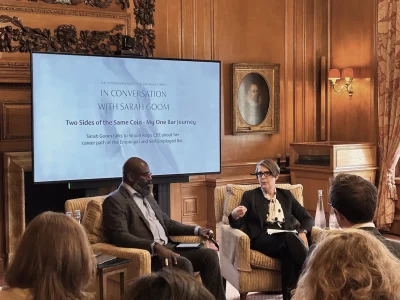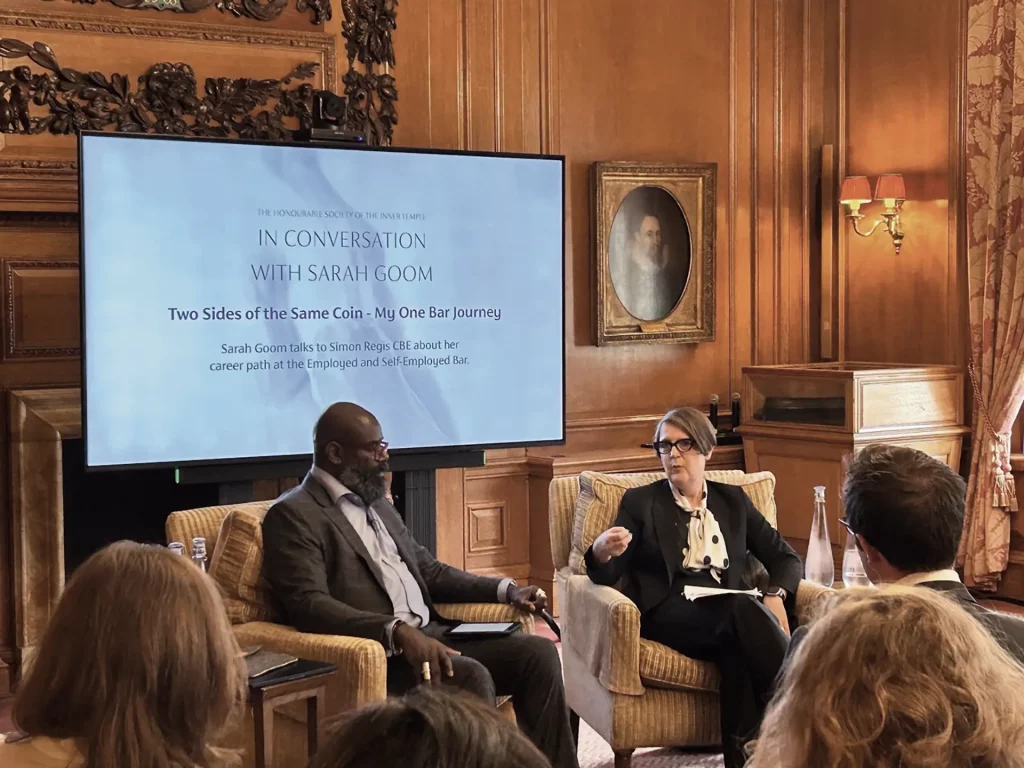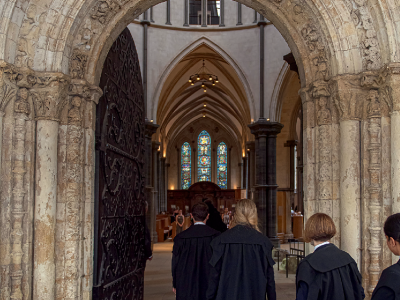

Employed Bar Forum: Two Sides of the Same Coin – My One Bar Journey
Sarah Goom, Director General, Commercial with Trade and International Direct, Government Legal Department in conversation with Simon Regis CBE.
Simon Regis: Can you give us a quick summary of your career to date?
Sarah Goom: I was called to the Bar in 1992 and did a criminal pupillage at 2 Paper Buildings. It was the time of unpaid pupillages and there were eight or nine pupils in competition with each other for work and at the end of my pupillage I did not get tenancy. I did a third six and then squatted in a couple of other chambers but couldn’t get tenancy so decided to leave the self-employed Bar temporarily – or so I thought.
I applied to what was then the Government Legal Service and was initially posted to the Criminal Appeal Office. I then moved as a prosecutor to HM Customs & Excise. I initially prosecuted drug importations and then moved to VAT and excise frauds.
Then followed a secondment to the Attorney General’s Office as a criminal justice adviser specialising in fraud, followed by a move to what was then the Department for Trade & Industry to head a team prosecuting insolvency and company law offences. In 2008, I moved to the Serious Fraud Office prosecuting very significant boiler room and other frauds. So, I spent the first 13 years of my time in the GLS increasingly specialising in fraud.

In 2009, in one of those brilliant twists of fate that sometimes happen in the GLS, I was offered the role of solicitor to the Chilcot Inquiry into the Iraq war. I spent four years at the Inquiry, and at the conclusion I decided that I did not want to return to fraud prosecution. At the Inquiry I had been exposed to the broad range of political, policy and legal issues in government and was keen to move to a role that would continue to give me that experience. I moved to a role heading Government Legal Department’s (GLD) division dealing with public and private law litigation against the Ministry of Justice, Home Office, Ministry of Defence, and the intelligence agencies. It was hugely interesting, and I enjoyed it immensely, but after five years I moved on promotion to director of Litigation at HMRC, and then moved to be director of personal tax advisory during the pandemic and helped develop the ‘furlough’ scheme.

In 2022, I moved back to GLD as the Home Office Legal adviser, leading on asylum and immigration, including the very challenging Rwanda scheme. In September 2023 I was promoted to my current role as Director General for Commercial with Trade & International where I have around 900 lawyers supporting six government departments, as well as all of the government’s commercial lawyers.
My career has been hugely varied and interesting – I feel I have been incredibly lucky.
SR: What role has given you the biggest sense of achievement and why?
SG: The Iraq Inquiry. It was a non-statutory Inquiry and the chairman Sir John Chilcot wanted it to operate more like a Parliamentary Select Committee. There were no core participants and no legal representation either for the Inquiry or other parties – I was the only lawyer working on the whole Inquiry. I drafted all the questions on the legal issues which the panel put to the legal witnesses, including Lord Goldsmith the Attorney General, Jack Straw the Foreign Secretary, Sir Michael Wood the Foreign Office Legal Adviser and his deputy Elizabeth Wilmshurst. I also did the first draft of the legal chapters of the inquiry report. I am not an international lawyer, but the Inquiry had Dame Rosalyn Higgins, former president of the International Court of Justice as an expert adviser. I would draft questions and sections of report, take them to her flat and discuss and correct them – rather like an Oxbridge tutorial.
SR: Have any of your roles not met your expectations and why?
SG: The Criminal Appeal Office was my first GLS role in 1996. I had not wanted to leave the self-employed Bar and felt that I had failed by not getting a tenancy. This was the time that the drama This Life about life at the Bar was on TV and I could not watch it I was so devastated. At the Criminal Appeal Office, I thought I was going to be working closely with judges, but the reality was that I was just drafting the factual summaries at the beginning of the court’s judgements – it was a bit of a sausage factory, just churning them out. But after about 18 months I asked to arrange some work shadowing at Customs & Excise prosecutions office and after a week, I had an offer to move there. As soon as I arrived, I knew I had found my place.
SR: We have called this session One Bar – Two Sides of the Same Coin to reflect the ‘One Bar’ concept. What are your reflections on how the employed and self-employed Bar complement each other?
SG: I took a great deal from pupillage and squatting that helped me get on in government and is still relevant to me now. For example, knowing how to draft quality instructions to counsel or how to chair a conference effectively – which I learned from being in conference and seeing it being done either well or badly. When I was head of the Litigation Division in GLD I introduced skills-based training teaching junior lawyers how to draft good instructions, and manage a conference, as not everyone had those skills and experience.
Also, my time at the self-employed Bar really taught me how to sift and evaluate evidence, identify key points, draft witness statements – and it was that experience that led to me being offered the role as solicitor to the Chilcot Inquiry. I had no background in international law or the law of armed conflict – but the then Deputy Treasury Solicitor thought my prosecution skills would be a good fit – and they were. Those skills are relevant to so much of what we do in GLD and why so many barristers find themselves at home here.
Also, I think that there is something about the confidence that being at the self-employed Bar can bring to leadership within the government legal profession. I am not sure if it is a coincidence, but the Treasury Solicitor and the three legal Directors General are all barristers – and we definitely do not lack confidence!
So, I very much believe that a career at the self-employed Bar is a complement to a government legal career and vice versa. I always thought that I would go back to the self-employed Bar and I know a number of GLD lawyers who have successfully done that.
SR: What are the challenges?
SG: In terms of moving from the self-employed Bar to government, I need to acknowledge that the opportunities for advocacy in government are limited. GLD does have an informal scheme for those interested in advocacy to conduct immigration hearings in the Divisional Court. The scheme fell into abeyance during the pandemic, but we are currently refreshing it. HMRC do advocacy in the Magistrates Court on Proceeds of Crime Act (POCA) cash seizures and some tax tribunals. There is undoubtedly room to do more, and we will work on that. But keeping up advocacy skills is a challenge.
I think there would always be a challenge in returning to the self-employed Bar in not having instructing solicitors. You need to be on the Attorney General Panels to be instructed in government work and need references, including from judges, to be appointed to those panels – so it is a bit chicken and egg. But people have successfully done it and it would be great to have more of a revolving door between the employed and self-employed Bar.
SR: What advice would you give to someone at the self-employed Bar who wanted to move into the employed Bar space – how would you sell it to them?
SG: Working at the heart of government is an exciting and privileged position. Seeing the issues on which you are working on the front page of the newspapers is a huge thrill.
Seeing the issues on which you are working on the front page of the newspapers is a huge thrill.
The variety of work is a great selling point, the ability to move between different disciplines and subject matter – as you can see from my career. Many of us consider ourselves public law generalists but you can also choose to specialise. We offer roles in ministerial advisory teams, but also in our three expert services – Employment Group, Litigation Group and Commercial Law Group. And within those four specialist areas you can choose to specialise in a range of areas: we are currently recruiting for planning and energy law specialists and will continue to bring in the specialisms the government needs.
SR: What would Sarah today say to Sarah at the start of her career?
SG: I would say “It’s going to be alright”. I thought that by not getting a tenancy that I had failed completely – in fact I have had a much more interesting career than if I had stayed at the Criminal Bar, although I can also see that I would have enjoyed it.
SR: In reverse, what would Sarah at the start of her career say to the Sarah of today?
SG: I was quite idealistic then and I might have taken issue with some of the policies that I have worked on – but I wouldn’t then have understood the absolute necessity for civil servants to serve the government of the day with absolute impartiality.
SR: If you could invite six people to dinner, who would they be and why?
SG: I had to think very hard about this and found it easier to think of historical figures. Outside work I love going to art galleries and the cinema, and I am a bit of a foodie, so this is what I came up with:
Oscar Wilde – dinner table conversation would not flag with him there.
Elizabeth David to cook the dinner – she changed the way the British eat, and she would be interesting to talk to.
Artemisia Gentileschi the 17th century Italian artist. Her father was Caravaggio’s friend, and she would have known him. She had an international reputation during her life and portrayed women characters as central to the biblical and mythical scenes she painted but was overlooked for centuries until very recently – like many women artists.
David Lynch the film director – I love Twin Peaks and think he would be a quirky dinner companion.
I felt I should have some lawyers in there too:
Tom Bingham – the former Lord Chief Justice – his book The Rule of Law is the book I recommend to young people interested in becoming lawyers. He was also a lovely man. He was Lord Chief Justice when I was working at the Criminal Appeal Office and I remember him coming to our Christmas party and being so friendly with us.
My last choice is a bit pretentious but reflects my twin interests in law and food – the French 18th century judge Brillat-Savarin. He acted as a judge under both the royalist and revolutionary regimes before and after the French revolution, but more importantly was a renowned gourmet who wrote a book called The Physiology of Taste, coining the phrase “you are what you eat”. He also has a very delicious cheese named after him.
Sarah Goom
Director General
Commercial with Trade and International Direct
Government Legal Department
Simon Regis CBE
Deputy Director – Science & Intellectual Property Team
Government Legal Department
(Elected Master of the Bench in July 2024)
